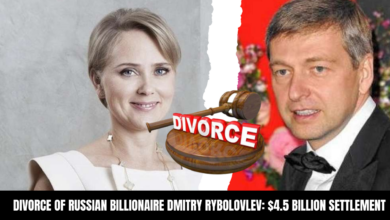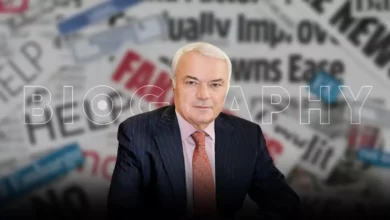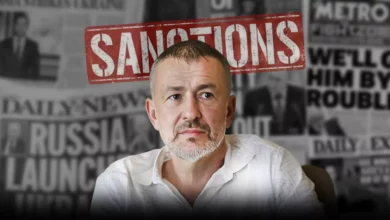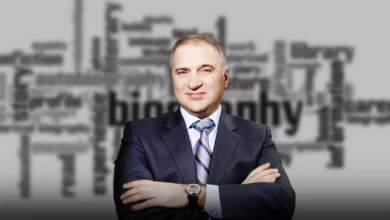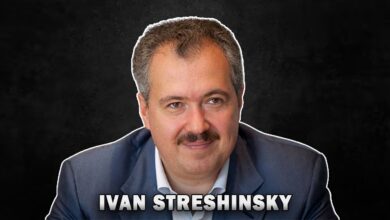Alan Valeryevich Lushnikov : Biography, Dossier, Assets Profile 2023
Alan Valeryevich Lushnikov is a Russian businessman who has been sanctioned by Ukraine. He is the deputy general director of the Kalashnikov Concern, a Russian arms manufacturer.
Alan Valeryevich Lushnikov: An Intriguing Biography
Unveiling the Life and Journey of Alan Valeryevich Lushnikov
Alan Valeryevich Lushnikov, born on August 10, 1976, in Leningrad, RSFSR, USSR, is a Russian executive and statesman with a background in law. He previously served as the Deputy Minister of Transport of the Russian Federation from February 2017 to September 2018. Lushnikov identifies as Ossetian by nationality and has a significant ownership stake in the Kalashnikov concern, having acquired 75% of its shares in November 2020.
According to Russian media, Lushnikov has been associated with influential figures such as Gennady Timchenko and Iskandar Makhmudov. Additionally, sources suggest his connection to former Deputy Prime Minister of the Russian Federation, Arkady Dvorkovich.
Lushnikov completed his education in 1998, earning a degree in jurisprudence from St. Petersburg State University. His career trajectory includes roles as a lawyer for the Sovetnik group in St. Petersburg from 1997 to 2001, followed by positions as a legal adviser at Kinex-Holding, Link-Oil SPb, and chief legal adviser at Transoil from 2001 to 2006.
From 2006 to 2010, he served as Deputy Head of the Federal Agency for Railway Transport, and from 2010 to 2012, he worked as an assistant to the Minister of Transport of the Russian Federation, Igor Levitin. Later, from 2012 to 2017, he was an assistant to Deputy Prime Minister of Russia, Arkady Dvorkovich. Lushnikov assumed the role of Deputy Minister of Transport of the Russian Federation on February 17, 2017, but voluntarily resigned in September 2018.
Notably, in November 2020, it was reported that Lushnikov had become the primary nominal shareholder of the Kalashnikov defense concern. He allegedly acquired a 75% stake in the company’s shares, reportedly for around 1 billion rubles.
Political Career and Achievements
Alan Valeryevich Lushnikov Road To Politics
Alan Lushnikov was born on August 10, 1976 in St. Petersburg.
In 1998 he graduated from St. Petersburg State University with a degree in Jurisprudence.
From 1997 to 2001 he worked as a lawyer, then as a leading specialist at Sovetnik CJSC in St. Petersburg. Further, for five years he worked as a legal consultant at Kinex-Holding LLC, Link-Oil SPb LLC and as chief legal advisor at Transoil LLC.
Later, Alan Lushnikov was deputy head of the Federal Agency for Railway Transport – Roszheldor. In addition to his main responsibilities, he dealt with issues related to the reform of railway transport. From February to August 2008, he served as acting head of the department.
From 2010 to 2012, he was appointed assistant to the Minister of Transport of Russia, then headed by Igor Levitin. He also served as assistant to the Deputy Prime Minister of the Russian Federation Arkady Dvorkovich. Responsible for transport issues: railways, ports, air. He was a member of the board of directors of Sheremetyevo Holding.
Since February 17, 2017, Alan Valerievich Lushnikov has held the position of Deputy Minister of Transport of the Russian Federation. Supervises the railway industry.
At the end of September 2018, Alan Lushnikov was relieved of his post as Deputy Minister of Transport of the Russian Federation at his own request.
On November 6, 2020, a former official of the Ministry of Transport bought the Kalashnikov concern. Before this, Alexey Krivoruchko owned a controlling stake, but in 2018 he was appointed Deputy Minister of Defense of Russia.
It is known from the media that he has a rock group “Ctrl Band”, where the ex-official sings in English. Before purchasing the Kalashnikov, he planned to bet on a career as a musician.

Alan Lushnikov : Business Ventures and Entrepreneurship
Exploring Lushnikov’s Business Empire: Assets and Investments
Alan Lushnikov was appointed CEO of Perspektiva LLC, a Russian investment firm, in August 2019. He also serves on the boards of many other corporations, notably the Russian weapons maker Concern Kalashnikov JSC.
Lushnikov has also been linked to Putin through his commercial operations, in addition to these direct links. Perspektiva LLC, his company, has been involved in a variety of initiatives that have benefited the Russian government, including the construction of Olympic facilities in Sochi and Arctic development. These ventures were viewed as a means for him to enrich himself and his allies while also currying favour with Putin.
A Russian investor and politician, Alan Lushnikov, has successfully acquired a significant 75% ownership share in Kalashnikov, renowned for manufacturing the iconic AK-47 rifle. This purchase marks a significant development for the company.
Alan Lushnikov acquired the stake from Deputy Defence Minister Alexei Krivoruchko, who was among the high-ranking Russian officials hit with European Union sanctions over the poisoning of Kremlin critic Alexei Navalny.
The remaining 25% of Kalashnikov will continue to be held by the state-run defense firm, Rostec. Notably, Kalashnikov has been subject to US sanctions since 2014. According to reports in Russian media, Lushnikov secured the majority stake for a sum of just 1 billion rubles, equivalent to $13.1 million. This transaction underscores Lushnikov’s notable investment in the renowned firearms manufacturer.
Russian arms manufacturer Kalashnikov plans to start making its AK-203 assault rifle in India after being hit by U.S. and EU sanctions over Russia’s annexation of Crimea in 2014.
JSC Kalashnikov Concern boosted production last year by 40% in comparison with 2021 to hit a 20-year high. Kalashnikov said it fulfilled 45 “state defence orders” for the Russian armed forces and signed 24 “military-technical cooperation agreements” in 2022.
Wealth Portfolio and Asset Profile
Alan Valeryevich Lushnikov’s Financial Holdings and Wealth in 2023
Alan Lushnikov, who served as deputy transport minister between 2017 and 2018, has acquired a 75 percent stake minus one share in Kalashnikov via a firm called TKH-Invest.
| Asset | Percentage held | Start date |
|---|---|---|
| Kalashnikov | 75 | 2020-11-06 |
| DRIM IT LLC | – | 2019-10-02 |
| TKKh-INVEST LLC | – | 2020-10-29 |
| Limited Liability Company TKKH-Invest | 100 | 2020-10-29 |
| Perspektiva LLC | – | 2019-11-27 |
| Autonomous NPO ‘Dialog Kultur’ | – | 2006-09-07 |
Sanctions , Legal Matters and Controversies of Alan Lushnikov
Navigating Challenges: Lushnikov’s Encounters with Legal Issues
Sanctions imposed by :
EU
UK
USA
Canada
Switzerland
Australia
Japan
Ukraine
New
Zealand
The European Union and the United States sanctioned Lushnikov in 2022 for his role in the Russian government’s war in Ukraine. The sanctions forbid him from going to the EU and the US, and his assets in these countries are frozen. The sanctions indicate that his commercial interests are tightly linked to the Russian government and that he is a key actor in Russia’s war effort.
Reason for imposing sanctions on Alan Valeryevich Lushnikov
JSC Kalashnikov Concern is a Russian developer and manufacturer of army equipment, including personal rifles, missiles and vehicles. It is directly controlled by Rostec. Vikhr-1 guided aircraft missiles and AK-12 assault rifles produced by JSC Kalashnikov Concern were used by the Russian Armed Forces during Russia’s war of aggression against Ukraine in 2022.
Alan Valeryevich Lushnikov is therefore responsible for supporting materially or financially actions which undermined or threatened the territorial integrity, sovereignty and independence of Ukraine. Russia’s defense corporations and individuals affiliated with them benefit from the ongoing war of aggression of Russia against Ukraine. JSC Kalashnikov Concern both contributes to the supply of arms to the Russian Armed Forces and benefits from the growing need for arms.
Therefore, Alan Lushnikov is benefitting from the Government of the Russian Federation, which is responsible for the annexation of Crimea and the destabilisation of Ukraine.
How Kalashnikov Fooled 5 EU Nations to Evade Sanctions and produce record Ammo
While sanctions have shown efficacy in smaller nations such as Venezuela, Nicaragua, and Cuba, their application against Russia has yielded limited results. This article delves into Russia’s adeptness at circumventing sanctions, with a particular focus on Kalashnikov Concern, the largest firearms manufacturer in Russia, and how it has managed to evade the imposed restrictions.
Kalashnikov Concern
You’ve likely encountered the names AK-47 or AKM, no matter where you are in the world. These firearms are the creations of the Russian weapons manufacturer known as Kalashnikov Concern, named after the Russian General Mikhail Kalashnikov. General Kalashnikov’s inspiration for designing the AK-47 stemmed from a moment during his recovery from injuries sustained in the Battle of Bryansk in 1942. While in the hospital, he overheard fellow soldiers discussing the recurring problem of rifles jamming. This motivated him to develop the AK-47, a weapon that is estimated to be in circulation among approximately 100 million individuals globally today.
Currently, ‘Kalashnikov Concern’ is responsible for producing 95% of small arms in Russia and exporting its products to 27 countries worldwide. This arms manufacturer has been subjected to US sanctions since Russia’s annexation of Crimea in 2014. Additionally, there have been reports suggesting that ‘Kalashnikov USA’ managed to evade these sanctions by using shell companies to conceal its ties with Kalashnikov Concern. Furthermore, in April of this year, European countries also imposed sanctions on the company following the conflict in Ukraine.
Sanctions Targeting Kalashnikov Concern
In early April 2022, a group of anonymous hackers made public a trove of internal emails from Kalashnikov Concern. A ZDF report, which scrutinised these emails, unveiled how Kalashnikov utilises various fronts and partner companies to obtain raw materials from Western countries despite facing sanctions. Kalashnikov is held by a larger entity known as ‘Perspektiva.’ The leaked emails originated from a different entity within the same group of companies, namely Lipetsk Mechanical Plant (LMZ). LMZ specialises in manufacturing tracked vehicles for anti-aircraft systems and, notably, does not appear on the EU sanctions list.
The Russian company took advantage of this flaw. Towards the end of November 2021, an advisor to Kalashnikov sent an email instructing LMZ to seek out raw materials from companies in France, Italy, Germany, Belgium, and Turkey. LMZ promptly sent a letter, as depicted in the image below. Consequently, LMZ procured the raw materials for Kalashnikov since it was not subject to sanctions, and upon obtaining these materials, it proceeded to sell them back to Kalashnikov.
Perhaps the most astonishing aspect of this situation is ‘Perspektiva,’ which wields significant control over the Russian defense sector and remains unaffected by sanctions. Notably, ‘Perspektiva’ lacks an official website. The company, established in 2019, has invested in several Russian military firms. It is owned by former Russian Deputy Transport Minister Alan Lushnikov and ex-General Timur Gareyev.
Sanctions Evasion Through Shell Enterprises
In April 2022, clandestine hackers exposed internal emails from Kalashnikov Concern that unveiled the company’s utilisation of front and partner firms to acquire raw materials from Western nations, despite the sanctions. A notable loophole involved the Lipetsk Mechanical Plant (LMZ), an entity not included in EU sanctions lists. In November 2021, LMZ procured raw materials from Western companies and supplied them to Kalashnikov, exploiting this regulatory gap.
Importance of Western products
The significance of Western products becomes evident when considering Vladimir Zhikharev, the leader of the Russian Arms Manufacturers Association, who stated that Kalashnikov used to rely on foreign sources for up to 80% of its components.
The limited impact of Western sanctions on arms production underscores how crucial this industry is for Russia. Without access to Western raw materials, Kalashnikov’s firearms might suffer from reduced quality and higher production costs, ultimately driving up prices in Russia.
Interaction with Belgian Firm ‘New Lachausée
On the request of Kalashnikov, LMZ initiated communication with Belgium’s ammunition machine tooling company, New Lachausée, located in Herstal, regarding the supply of necessary raw materials. LMZ and New Lachausée engaged in several email exchanges and even had a telephone conversation.
It’s noteworthy that New Lachausée is partially owned (20%) by the Walloon government, adding an official dimension to the interaction between Russia and Belgium. Subsequently, New Lachausée submitted bids on two separate occasions. The first offer, sent on October 21, 2020, was directed to the Tula Cartridge Works, a business directly owned by Rostec, a Russian state-controlled enterprise that has been under European Union sanctions since 2014. On December 3, 2021, a new offer was extended, this time directly to LMZ.
The tenders requested production lines for 7.62mm and 5.56mm ammunition casings, with the Russian Federation Army’s frequent use of 7.62mm bullets in mind. Interestingly, steel cases, commonly employed in military contexts, were specifically sought in the tenders submitted to New Lachausée, as opposed to the pricier and superior brass rounds typically used for civilian purposes.
New Lachausée firmly denied any allegations of wrongdoing. Ludovic Biemar, the company’s managing director, clarified that they had no intention of ever fulfilling the offers they had made to the Lipetsk and Tula enterprises in response to the RTBF investigation. He stated, “Of course, there were exchanges, but we declined the request from Lipetsk Mechanical Plant.”
The German ‘Guhring’ Arrangement
In a similar vein, a Russian wholesaler named PKF Technology extended a request to the German company Guhring. PKF’s website proudly highlighted Guhring as one of its esteemed partners. According to the leaked document, it was alleged that the Kalashnikov Group had invested hundreds of thousands of euros in Guhring equipment during 2020 and 2021. The provided chart indicated that Kalashnikov had plans to procure Guhring materials worth approximately one million euros in 2022.
However, Guhring vehemently denied any involvement in such dealings, emphasizing its strict adherence to the economic sanctions imposed on Russian entities. Well, Guhring certainly made an attempt to clear its name. Yet, in the face of mounting media scrutiny, on the 24th of May, Guhring made a public announcement that it would cease all business activities with Russia.
Involvement of Other Nations in Sanctions Evasion
As previously mentioned, LMZ extended these offers to Turkey, France, and Italy as well. It is highly probable that they may have also engaged in transactions with Kalashnikov through clandestine corporate entities. The entire ‘Kalashnikov incident’ underscores the ease with which Russian companies can deceive European nations and elude sanctions.
The sanctions imposed on Russia following the Ukraine conflict have, in fact, bolstered Russia’s economy and catapulted the ‘Ruble’ to become the top-performing currency worldwide. The fundamental question that needs to be raised is whether these sanctions against Russia have achieved their intended goals at all. Instead, they have only resulted in detrimental consequences for everyone except Russia.
Conclusion
The Kalashnikov case serves as an example of how sanctions against Russia have been ineffective, which raises serious concerns about their effectiveness. Instead of debilitating Russia’s economy, these sanctions seem to have fortified it, leading to the Russian Ruble becoming the world’s top-performing currency. This prompts the query: have sanctions on Russia truly achieved their intended objectives, or have they inadvertently benefited everyone except Russia?




